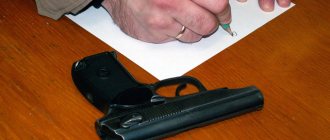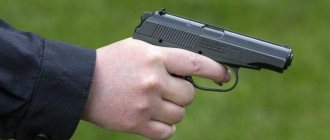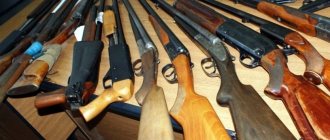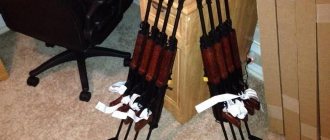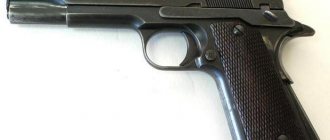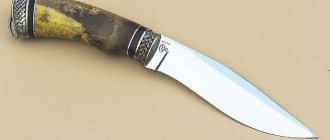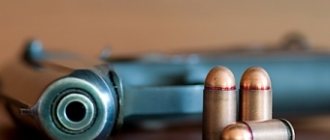When thinking about issues of the legality of owning firearms, it is necessary to clearly understand the root reasons why the state is trying to establish complete control over civilian weapons. Approximate calculations show that for every tenth resident of Russia there is one weapon. Moreover, this unit is kept in private hands.
The public has been fighting for so long for the right to arm themselves for self-defense that they finally have that right. Sad statistics show that the crime rate has not decreased, and the number of crimes committed with the use of weapons has even increased.
The state, on the one hand, legalizes the purchase of traumatic weapons, and on the other hand, it tightens the requirements both for the owners and for the models themselves from the category of firearms of limited destruction. The main emphasis is on ensuring control over the manufacture, acquisition, carrying and storage of weapons. These responsibilities are assigned to the licensing system, which today exists under the auspices of the VNG of the Russian Federation. The main measures to ensure the above control are registration and licensing.
Legal basis for gun ownership
The main law that regulates the rules for the acquisition and storage of civilian weapons is the Law “On Weapons,” which came into force in 1998, and is currently relevant in its latest edition. According to one of the articles of this law, owners of traumatic weapons, which are defined as firearms of limited destruction, are required to have a license. The fact is that licensing is a unique way to establish the possibility of giving a citizen the right to acquire and carry weapons.
The licensing procedure requires documentary confirmation of the applicant’s compliance with the requirements. Having collected the necessary documents, the citizen receives permission to purchase trauma equipment. After this, within the established time frame, the barrel must be registered and a license to store and carry it obtained. Otherwise, arms trafficking is considered illegal.
This law stipulates not only the licensing requirement, but also defines standards for traumatic weapons. This is a firearm designed to fire special traumatic cartridges. It is not aimed at hitting a living target or causing significant damage to it. The muzzle energy of an authorized weapon must not exceed 91 J. The following requirement is formulated for a pistol clip or revolver cylinder. The magazine should not hold more than 10 rounds. The trigger mechanism of the pistol can be of a double type, that is, firing by self-cocking is possible, but firing in bursts in automatic mode is excluded.
Another important document is government decree No. 814, the latest version of which was adopted on May 12, 2018, which establishes measures to regulate the circulation of civilian weapons. Among other things, it is determined that citizens have the right to carry traumatic weapons to ensure their own safety. The same resolution approves the rules for the circulation of weapons.
How to obtain permission to purchase an “injury”
A person over 21 years of age can apply for such a license. The procedure for obtaining permission to purchase and carry traumatic weapons includes several stages:
- Passing a medical commission. The examination is carried out only in state medical institutions that have the right to issue certificates of form 046-1. Passing the commission is always paid and involves a medical appointment with a therapist, psychiatrist, narcologist, ophthalmologist (visual acuity not lower than 0.5 in one eye, not lower than 0.2 in the other).
- Take a paid training course (about 5,000 - 7,000 rubles) on the use of weapons in a special certified educational institution. During the 12-15 hour courses you will listen to lectures on the rules for acquiring and subsequently using weapons. And also about liability for storing weapons without permission. The final part of the course includes practical exercises. You can find out which educational institutions have the right to teach weapons courses in the territorial department of the Russian Guard.
- Apply with an application in the established form to the branch of the Russian Guard at your place of residence, namely to the Licensing and Permitting Department (LRO). The exact address of your department can be found by following the link. In the application, in addition to your personal data, you will be asked to indicate the purpose of purchasing the weapon and the place of storage.
- The application must be accompanied by: a copy of your passport;
- 3x4 photo;
- receipt of payment of state duty (500 rubles),
- certificate of no criminal record.
Usually, within 10-14 days, the person applying for a license receives a message about the need to arrive at the appointed time at the LRO. The received license is valid for 5 years.
Scheme for obtaining a license:
| Stage 1 | Medical commission | photo 3x4 |
| Narcological, psychoneurological dispensary | 2 certificates | |
| Stage 2 | Education | photo 3x4 |
| Exam | certificate of completion of courses | |
| Stage 3 | LRO | copy of passport, certificate of courses, 2 photos 3x4, application for a license, certificate of no criminal record |
| Pay the state duty | receipt | |
| Checking for a safe | buy and install a safe | |
| Stage 4 | Obtaining permission from LRO | Then buying a traumatic weapon |
Submission of documents through State Services
Everything is almost the same as “live”. Just no queues. And also the state duty will be 30% cheaper (if you pay through the Internet resource service).
In general, the algorithm is like this:
- authorization on State Services;
- drawing up an application and attaching documents in digital form;
- payment of state duty;
- receiving notification of a visit to the Rosgrvadia department;
- making this visit (meeting with the LRS inspector);
- Pending Verification;
- The final stage is obtaining a license.
Who was left without a license
The question of what the storage of traumatic weapons without a license can lead to does not have a clear answer. The fact is that responsibility for the lack of a permit largely depends on the actions of the citizen himself, as well as on the circumstances that led to the illegal trafficking of weapons. We will try to simulate several life situations in order to subsequently determine which article of the criminal or administrative code is applicable in each specific case.
- The first case implies that the traumatic pistol was purchased legally, and the buyer presented permission to purchase the traumatic pistol. In addition, the weapon is registered, and the citizen is its official owner. By coincidence, he did not manage to renew his license on time. This means that from the moment it ends, the possession and, especially, the use of weapons is illegal.
- Let’s imagine that a citizen with an expired license did not apply for it for fear of being punished. Gradually the period of delay will increase. Finally, it will begin to be calculated not in days or months, but in years. Judicial practice shows that the consequences will depend on the length of delay, as the judge assesses the citizen’s desire or unwillingness to return to the law.
- The owner of the weapon followed the legitimate path, he collected all the documents and received permission to purchase the weapon, but after the acquisition he did not register the barrel and was left without a license. This is a more serious violation, which indicates a deliberate disregard for the provisions of the law. You won't be able to stay in the shadows for long. Even if you are not caught red-handed by a law enforcement representative, “good-natured” neighbors or “faithful” friends can make an information call to the police.
- If you don't have permission, they won't talk to you (not literally) in any gun store. The only way to purchase weapons is the black market, which, unfortunately, is still thriving in our country. Naturally, there can be no question of any legality, and since no documents confirm the nature of the transaction, the citizen may be charged not with the purchase, but with the sale, which is already fraught with a criminal case.
If you look at the questions asked by visitors to weapons forums, and take only topics related to the illegal carrying of traumatic weapons, then at first glance it may seem that each has its own objective reason, so such situations should be simulated several times more. But in fact, we have described the main components of violations of the law, and the details and details of their manifestation are no longer so significant.
Additional features and nuances
1. People who are under the influence of alcohol or drugs are not allowed to carry weapons. Thus, many drugs are not eliminated from the body for several weeks. If authorized persons detect traces of such substances in the blood of an armed person, he will be deprived of weapons, the right to own them, and will also receive a fine.
2. If a person is traveling by car, then the traumatic weapon can be carried separately from the cartridges in a case or on oneself when loaded. If he is on a train or subway, then only transportation of weapons is allowed - carrying is prohibited. And before flying, you must first contact the company and find out whether a person with a weapon will be accepted on a particular flight. For example, Pobeda stopped accepting passengers with weapons. Registration of a weapon takes a lot of time: the police will pick it up and release it to the owner only upon arrival back.
3. If the police ask to show a weapon along with documents for it, then first the owner needs to clearly warn the officer that he will now take it out (if you suddenly take out the barrel and start waving it, the person can be shot), and then slowly take it out without pointing it at the policeman's side.
Violation of registration deadlines
The first case considered will be interpreted in exactly this way.
- On the one hand, this is not such a serious violation, because the citizen did not have the intention to commit a crime, but violated the law as a result of negligence.
- On the other hand, punishment for delay cannot be avoided. One month before the license expires, the owner must contact the OLRR with an application for its renewal. If this deadline is not met, and the license is still valid for several days, then a fine may be imposed on the citizen.
Punishment for violating the deadlines for registering weapons is provided for in Article 20.11 of the Code of Administrative Offenses of the Russian Federation. This article states that for failure to comply with the deadlines for registering a weapon or renewing a license, the violator faces a fine of 1,000 rubles to 3,000 rubles. Practice shows that if the delay lasts several weeks, the minimum fine will be imposed.
When the permit is expired
Let's start with the fact that you can extend your license for another 5 years by contacting the LRO three months before its expiration. Applying for an extension at a later date (for example, two weeks before the end of the 5-year period) may be grounds for refusal to renew.
To renew your license, you must submit to the Russian Guard the same documents as when you initially applied for the first purchase of a weapon, except for documents confirming passing the exam. When renewing your permit for the next five years, you do not need to take training courses.
- In case of an expired permit, the owner of a traumatic weapon bears administrative penalties (from a warning to a fine of 3,000 rubles ).
Long license overdue
If the period for re-issuing a license has long expired, and the regulatory authorities have become aware of the storage of traumatic weapons, then the owner will face a more severe punishment. First of all, his actions can also be considered under Article 20.11 of the Code of Administrative Offences, only the maximum fine will be imposed. The difficulty lies in the fact that there is no clear definition between an intentional or unintentional violation of the law. Judicial practice shows that an offense with a delay of several years can be reclassified under a more severe article.
Article 20.8 of the Code of Administrative Offenses determines the punishment in case of violation of the rules for the circulation of weapons. In particular, a citizen who keeps traumatizing equipment at home can theoretically receive one of the following punishments:
- A fine ranges from 3,000 rubles to 5,000 rubles, and the weapon can be confiscated until the permits are fully restored.
- Temporary seizure of weapons and administrative arrest. Its duration is determined individually and ranges from 5 days to 15 days.
- For the official, the amount of the fine increases. The range is from 10 to 50 thousand rubles. In parallel, this will be followed by deprivation of the right to obtain a license for three years. The weapon is confiscated.
In reality, the matter will not come to an arrest, but the weapons will be taken away. They will give you the opportunity to complete all the paperwork and issue a fine. A personal conversation is not excluded, during which the violator will be proven that compliance with the law is an important component of gun ownership.
Self-defense equipment that does not require a license
There are several types of self-defense means that do not require mandatory permission:
- Air pistols or revolvers - the muzzle force (power) should not exceed 7.5 J, and the bullet diameter should not exceed 4.5 mm.
- Gas cartridges with various fillings are especially popular among representatives of the “weaker sex”, they take up little space, and are easy to use. The main requirement for the owner is the age of majority.
- Stun guns - allow you to immobilize an attacker, operate on batteries and require skill to use. The maximum effect is achieved by direct touch, and this is not always possible, especially in winter.
- “Udar” is a device that is a combination of gas and pneumatic weapons that shoots special capsules containing liquid. It works well regardless of the weather or time of year.
The signal, noise, starting type pistol - “Zoraki 914” is not a military weapon and is used for its intended purpose in sports competitions. It creates a loud noise effect with the emission of flames and is more suitable for signaling in case of danger or as a dog repeller. The Zoraki model fires blank cartridges. By unscrewing and removing the special plug, the gun can be used as a flare gun. It is allowed to buy a Zoraki injury without a license, but using it as a means of self-defense is prohibited by law. In addition, there is also a prohibition on sending this product by mail.
No license for traumatic weapons
If a license is missing and has never been issued, it is not for nothing that we have divided this case into two types. First, let's talk about legally acquired weapons. Even before 2010, for illegal possession of weapons, including traumatic weapons, the degree of punishment was determined by Article 222 of the Criminal Code of the Russian Federation. Since then, the content of the article has not changed, but regarding injuries acquired legally, it has ceased to be used. The violator faces punishment under Article 20.8 of the Code of Administrative Offences. But there is one nuance here.
Aggravating circumstances can significantly change the measures taken. If the owner carried a weapon while intoxicated, the barrel will be confiscated without the possibility of return, and the offender will not be able to obtain new permits for several years.
Trauma is allowed only for self-defense. When a gun owner's actions exceed the limits of carrying regulations, such violations may result in a fine, the amount of which is determined by regulatory authorities. However, if it turns out that a citizen used trauma to threaten the lives of others, then his act is considered by the criminal code. Article 119 of the Criminal Code of the Russian Federation defines punishment for a threat to life in the form of imprisonment for two years.
Grounds for refusal to issue a license
A person will be denied a permit if the following circumstances are identified:
- applicant's age – up to 21 years;
- there are contraindications due to health or well-being;
- the relevant exam was not passed;
- no permanent place of residence;
- the applicant has violated hunting regulations in the past and received corresponding orders;
- the person who applied is subject to a conviction for any intentionally committed crime (but if the criminal record has expired or it was canceled early, a license will be issued);
- the person, within a year before applying for a license, committed at least two administrative offenses, violating public or administrative order;
- the applicant is serving a prison sentence (the type of crime is not important, even if it was committed accidentally);
- The applicant applied for a license when the 1-year validity period of the medical certificate had already expired.
At the same time, in case of an unreasonable refusal to issue a license, the applicant has the right to appeal this decision of the LRO employees by going to court. At the same time, judicial practice contains almost no cases of appeals for these reasons. The legislation establishes an exhaustive list of requirements for the applicant.
Illegally purchased weapons
The most difficult case involves carrying weapons that were purchased on the “black” market.
- On the one hand, carrying a traumatic weapon without permission should be punished only under an administrative article.
- On the other hand, the state takes a rather tough approach to the issue of suppressing illegal arms trafficking. This is understandable, since most crimes are committed with the help of unregistered guns.
The “black” arms market, working for criminal organizations, creates a potential danger to society on a global scale. Even if the sale of trauma products is organized, the degree of danger is not reduced. Criminal elements prefer to buy a barrel inexpensively, convert it into a combat weapon, use it once and get rid of it. Naturally, the state will strictly suppress the production and sale of illegal weapons by all competent departments.
The fate of the unfortunate owner who bought a traumatic pistol without documents in a gateway is difficult to predict. Everything will depend on his desire to cooperate with the investigation. In the worst case, he may be accused of selling illegal weapons, and this is punishable under Article 222. The maximum possible consequences are a fine of 80 thousand rubles and imprisonment for 4 years.
This is approximately what the distribution of crimes looks like under administrative and criminal articles. In practice, everything depends on the specific case. But violation of the law related to the circulation of weapons has always been considered severely punishable, so owners of even traumatic weapons prefer to vigilantly monitor compliance with the rules for storing and carrying firearms.
Permission to carry and store
When buying a weapon, sometimes you doubt whether it is allowed for civilians. You can get reliable information on the website of the Russian National Guard (section “List of types and models of service and civilian firearms”)
After purchasing a traumatic weapon (six months are allotted for this from the date of obtaining a license), you will receive permission to store and carry weapons. When applying to the licensing and permitting service department at your place of residence, you must submit:
- a copy of the license for the purchase of weapons, where there is a store mark, as well as a receipt;
- insurance contract concluded when purchasing weapons;
- two 3x4 photographs;
- receipt of payment of the state fee for registration.
Since within two weeks it is necessary to make experimental shots from the newly acquired weapons (organized in the LRO). Spent cartridges are submitted along with the application.
Within 10 days allotted for consideration of the application, the inspector of the Russian Guard is obliged to check compliance with the conditions for storing weapons at the place specified in the application. Failure to comply with storage rules (lack of a safe, for example) will result in refusal to issue a permit.
Is it possible to avoid punishment
By observing the following rules for storing and carrying your traumatic weapon, liability for violating the requirements of the license itself can be avoided:
- Do not wear the injury in crowded places, such as clinics, hospitals, catering establishments, cinemas, theaters, shopping centers, etc. (unless this is part of the work activity, for example, a security service located at a security facility).
- Do not carry a weapon while intoxicated, even slightly.
- Have no more than two weapons, the type of which is permitted by the license.
- Do not modify the weapon by installing additional accessories on it, such as a silencer or a device for night vision, for example. Their installation is strictly prohibited by current legislation.
- Keep weapons only in a locked safe so that no one else has access to them.
Use a gun only in cases of extreme necessity, when you need to protect yourself. And then, before doing this, you must first shoot in the air as a warning. And only if this does not help calm down the one who wants to attack you, you can use your means of self-defense to neutralize the enemy.
And don’t forget that there is only one step from an ordinary offense to a crime. It is enough to commit a criminal offense with the help of a pistol intended for self-defense, having crossed the line.
